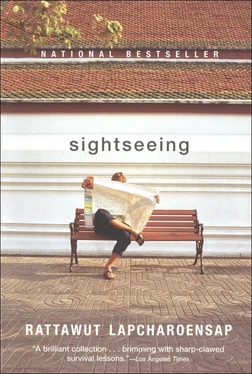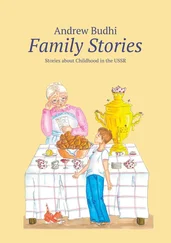Fortunately, the wife feeds me in a respectful, close-mouthed way today, dabbing at the corners of my lips with a cloth napkin. Ever since I got here I’ve been having drool-management problems. I’ve been a leaky faucet.
“You feel better today, Mister Perry?” she asks, and I say, in between bites, sucking back the spittle pooling at my gums, “Yeah. I feel like a million bucks, woman.”
I’m not that hungry. Halfway through the meal I shake my head and the wife starts eating her own meal. As always, it’s hot as hell. My stomach’s sweating clean through my shirt. For a while I just sit there and stare at the kids spooning clumsily at their fried rice and egg, talking to each other in Thai, the wife nodding now and again at something they say.
Neither of the children look much like me. I have to look real hard to find any resemblances. They have broad flat noses, long banana-shaped eyes, dark auburn hair, and clear toffee-colored skin. None of them look much like Jack, either, though the boy’s eyes are Jack’s brown-speckled blue and they’ve both inherited my son’s thin lips and strong square jaw. But these are attributes Jack himself inherited from Alice. There’s actually not much of me in Jack so I suppose it makes sense there isn’t much of me in these kids. Still. I have to remind myself sometimes that they’re not adopted, that these children are my own flesh and blood, that somewhere in their little brown bodies some brilliant characteristic of mine might reveal itself in due time, even if I have trouble pronouncing their names and they have trouble pronouncing mine. (My name’s oftentimes a verb on their tongues— Parry —sometimes even an adjective— Purry —like I’m a cat — so I’ve made them call me “Grandfather” instead. I rarely say their names at all. I call the girl “girl” and the boy “boy,” since the few times I tried calling them by their real names, “Ruchira” and “Sornram,” they’d both laughed insensitively at my attempts.)
Now I’m not saying people shouldn’t mix. The heart will do what the heart needs to do. And Macklin Johnson is my best friend in the whole world. But at least Mac can see himself in Tyrone and the grandchildren. At least he can call them by name. At least they all speak a common language. At least Mac can look at them and say, “Yes, you’re my son, you’re my grandchildren, you all came from my own flesh and my own blood,” though given his condition lately he’s probably starting to confuse them all. At least Macklin Johnson isn’t stuck in this tropical jungle of a city wondering how the hell these people — his only living heirs — could be even remotely related to him.
But I don’t really mind the mongrels. I’m actually dreading the day they have to go back to school. Even if they don’t say much to me, it’s nice to have them around. They keep me company while Jack’s at work. I spend most days sitting in the wheelchair watching them play, lifting that five-pound barbell, dozing in and out of sleep.
My six-year-old grandson adores his older sister to the point of self-annihilation. He does whatever she tells him. He’s the most gullible kid I’ve ever seen. Each day he happily submits himself to whatever new experiment in misery his sister comes up with. I’d like to teach him a little something about self-respect, but the way things are going right now I can barely communicate to him what time of day it is.
Today the girl’s convinced him to be her pet dog for the afternoon. The boy’s down on all fours. He’s leading his sister around the house and the front yard with a long string of black yarn tied loosely around his neck, barking, sniffing the ground, panting happily at his sister. “Hey,” I say to the girl, “that’s not very nice,” but she just blinks at me and says, “He likes it,” the boy barking in agreement, so I leave them to it.
An hour later, the boy licks my left leg and the leg jerks back into his face as any man’s leg would when he’s half-asleep in his wheelchair.
The boy falls back, looks up at me for a moment, and then he starts to cry. The girl laughs, though she crouches down to see if her brother’s okay. He’s not. He’s bleeding lightly from the nose.
“Oh shit,” I say, bending forward in my seat. “You all right, boy?”
But he’s already running upstairs to his mother, that string of yarn flying behind him like a kite’s tail. The girl stands there shaking her head at me.
“Why?” she asks me in English. “Why Grandfather kick his ass?”
“I didn’t kick his ass, girl. I kicked him in the face.” For some reason I’m laughing. “Not funny, Grandfather,” she says. “Ass. Face. Whatever. He crying. ”
“I know,” I say. “I know. I didn’t mean to. I was half-asleep. I didn’t know what I was doing. It’s your fault he was licking my leg in the first place, you know.”
A few minutes later the wife’s looming over me, the boy sniveling at her side. “What happen?” she asks me, frowning, and I try to tell her, but the boy keeps interrupting me, pointing and crying some more in Thai. He’s got two humongous wads of toilet paper in his nostrils. She tries to quiet him down, crouches and gathers him in her arms. “You kick him?” she asks me, stroking the boy’s head. “Why you kick his face, Mister Perry?”
“It was an accident,” I say. “I was sleeping, Tida. I didn’t mean to. They were playing a game and—” The girl interrupts me and says something to the mother in Thai, gesticulating with her arms. For a second I think she’s framing me, because the wife looks at me severely. But then the wife smiles, hands the little boy over to his sister, and the children walk hand-in-hand out to the sunny front yard.
“He be okay, Mister Perry,” the wife says. “He just scared.”
“Tell him to come back, Tida,” I say. “Tell him I want to say sorry. I didn’t mean to kick him, you know.”
“I know,” she says. “But maybe later, Mister Perry. Right now he just frightened. You say sorry later, okay?”
But the boy avoids me for the rest of the day. He can’t even look me in the eye. I try to make amends. I fold a paper airplane with my good left hand. But my hand’s too shaky again and it turns out crumpled and lopsided. I do my best to toss it at the kids, but they both ignore the thing as it flops down between us. I even call the boy by his real name to get a laugh. The boy whispers something to his sister, they go get their badminton racquets, and then they both head out to play in the empty afternoon street. I’d like to watch them, but it’s sweltering hot today and when I went outside last week I’d puked from the heat. So I just sit for the rest of the afternoon by the front door watching the feather shuttlecock sail up and down, back and forth, beyond the property wall, hoping Jack will come home soon to save me.
When I first arrived Jack and his family thought it would be a good idea to take me around the city. Jack took the week off work and we piled into the Corolla every morning. I’d sit up front in the passenger seat while Tida mediated peace between the children in back.
Given the city’s traffic, we never went to more than a few places each day. I thought rush hour in Washington was awful, but Bangkok traffic makes downtown D.C. look like a Formula One racetrack. I don’t remember much about that first week except spending most of my time staring listlessly out the passenger-side window, falling in and out of sleep, the car moving in tiny fits and starts the whole way. “It’s a goddamn parking lot out here,” I said the first day while we were stalled at a traffic light for what seemed like an hour.
Temples, temples, and more temples. That’s all we ever went to the first few days. For some reason, Jack and his wife thought it would be useful for me to see them. The children weren’t having too good a time and I didn’t blame them — children and places of religious worship don’t, as a rule, mix very well. They’d be bored to death, wringing their hands in the car, while Jack and the wife wheeled me inside to admire some temple. I wasn’t having too good a time either. I would’ve preferred to sit in the cool, air-conditioned sedan with the kids. While I can certainly learn to appreciate cultural differences, if Tida and the children came to visit me in Washington and I took them on a tour of all the city’s churches, I don’t think they’d have a very good time either. So on the third morning, I told Jack that there’s only so many temples a grown man can look at — no matter how beautiful or colorful or interesting the temples may be — and I told him that this city was just too goddamn hot for a man in my condition anyway. “Jack,” I said, “I’m not some tourist, you know,” and Jack said, “Fine, Father. Let’s just stay home then. Let’s just sit here and pretend like there isn’t a world outside this house.”
Читать дальше











